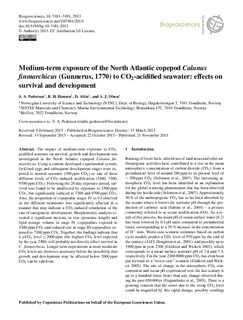Medium-term exposure of the North Atlantic copepod Calanus finmarchicus (Gunnerus, 1770) to CO2-acidified seawater: effects on survival and development
Journal article, Peer reviewed
Permanent lenke
http://hdl.handle.net/11250/2368285Utgivelsesdato
2013Metadata
Vis full innførselSamlinger
- Institutt for biologi [2614]
- Publikasjoner fra CRIStin - NTNU [38525]
Sammendrag
The impact of medium-term exposure to CO2-acidified seawater on survival, growth and development was investigated in the North Atlantic copepod Calanus finmarchicus. Using a custom developed experimental system, fertilized eggs and subsequent development stages were exposed to normal seawater (390 ppm CO2) or one of three different levels of CO2-induced acidification (3300, 7300, 9700 ppm CO2). Following the 28-day exposure period, survival was found to be unaffected by exposure to 3300 ppm CO2, but significantly reduced at 7300 and 9700 ppm CO2. Also, the proportion of copepodite stages IV to VI observed in the different treatments was significantly affected in a manner that may indicate a CO2-induced retardation of the rate of ontogenetic development. Morphometric analysis revealed a significant increase in size (prosome length) and lipid storage volume in stage IV copepodites exposed to 3300 ppm CO2 and reduced size in stage III copepodites exposed to 7300 ppm CO2. Together, the findings indicate that a pCO2 level ≤2000 ppm (the highest CO2 level expected by the year 2300) will probably not directly affect survival in C. finmarchicus. Longer term experiments at more moderate CO2 levels are, however, necessary before the possibility that growth and development may be affected below 2000 ppm CO2 can be ruled out.
